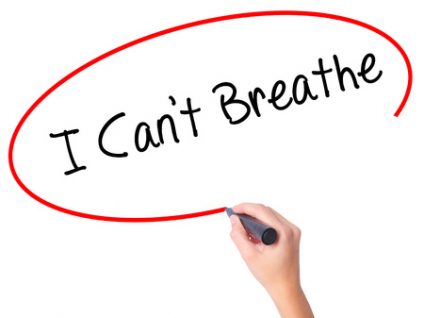
Every maternal death is an extraordinary tragedy, but Erica Garner’s death seems particularly bitter in its irony.
According to NPR:
She entered the public eye in July 2014 when her father, Eric Garner, died after being put in a chokehold by a New York City police officer. Eric Garner was seen on video saying, “I can’t breathe” 11 times before he died.
Why did Erica Garner die? She died because she couldn’t breathe.
[pullquote align=”right” cite=”” link=”” color=”” class=”” size=””]She died because she couldn’t breathe.[/pullquote]
Erica Garner had been in a coma since Dec. 23, when she had an asthma attack that triggered a heart attack, according to the New York Daily News.
“When her son was born in August, she named her newborn after her father,” the newspaper reports. “Garner suffered her first heart attack shortly after the delivery, with doctors saying the pregnancy stressed her already enlarged heart.”
Eric Garner became an icon in the Black Lives Matter movement. Now Erica Garner appears destined to become a icon in the effort to reduce black maternal mortality. In many ways, she is emblematic of the current crisis of black maternal mortality.
Prior to 1999, Erica Garner’s death would not have been included in maternal mortality statistics for two reasons. First, occurring as it did four months after the birth of her son, it would have been considered a “late” maternal death; US mortality statistics which included deaths up to 42 days after delivery. Second, Garner did not die of a pregnancy complication but of pre-existing diseases (heart disease and asthma). Indeed, researchers have found that anywhere from 75-100% of the recently reported increase in US maternal mortality is the result of expanding the classification of maternal deaths.
Erica Garner’s death is emblematic of US maternal deaths in several other ways. She was black and black women die at 3X the rate of other American women.
She appears to have had pre-existing heart disease (an “enlarged” heart). Heart disease is the leading cause (and fastest growing cause) of maternal mortality in the US. What causes an enlarged heart and how did it contribute to Garner’s death?
An enlarged heart can reflect a dilatation of the chambers of the heart (dilated cardiomyopathy) or an increase in the size of the heart muscle (hypertrophic cardiomyopathy).
According to the American Heart Association:
Dilated cardiomyopathy (DCM) is the most common type, occurring mostly in adults 20 to 60. It affects the heart’s ventricles and atria, the lower and upper chambers of the heart, respectively.
Frequently the disease starts in the left ventricle, the heart’s main pumping chamber. The heart muscle begins to dilate, meaning it stretches and becomes thinner. Consequently, the inside of the chamber enlarges. The problem often spreads to the right ventricle and then to the atria.
As the heart chambers dilate, the heart muscle doesn’t contract normally and cannot pump blood very well…
Often, cause of dilated cardiomyopathy isn’t known. Up to one-third of the people of those who have it inherit it from their parents.
Some diseases, conditions and substances also can cause the disease, such as:
Coronary heart disease, heart attack, high blood pressure, diabetes …
Complications during the last month of pregnancy or within 5 months of birth
Dilated cardiomyopathy that develops at the end of pregnancy or within 5 months postpartum is known as peripartum cardiomyopathy.
Alternatively, an enlarged heart can be a pre-existing condition that occurred independent of pregnancy.
Hypertrophic cardiomyopathy (HCM) is very common and can affect people of any age. It affects men and women equally. It is a common cause of sudden cardiac arrest in young people, including young athletes…
Hypertrophic cardiomyopathy occurs if heart muscle cells enlarge and cause the walls of the ventricles (usually the left ventricle) to thickenHypertrophic cardiomyopathy usually is inherited. It’s caused by a change in some of the genes in heart muscle proteins. HCM also can develop over time because of high blood pressure or aging. Diseases such as diabetes or thyroid disease can cause hypertrophic cardiomyopathy. However, the cause of the disease isn’t known.
Peripartum cardiomyopathy usually leads to heart failure (inability of the heart to pump effectively) and not a heart attack (myocardial infarction or MI). Hypertrophic cardiomyopathy can lead to an MI when the enlarged heart’s increased need for oxygen can’t be met by the ineffectively beating heart. Of course it is impossible to know what happened to Garner simply based on news reports since mainstream media sources tend to use terms like heart attack, heart failure and cardiac arrest interchangeably even though they mean very different things.
The proximate cause of Garner’s death was not pregnancy or cardiovascular disease, but asthma. Pre-existing chronic health conditions like asthma are the second leading cause of US maternal deaths.`A severe asthma attack leads to a decrease in oxygen because the patient literally cannot breathe. Garner’s heart was already compromised twice over, first by the enlargement and then by any damage sustained as a result of the heart attack that occurred in the days after her baby’s birth. It seems as though her heart simply could not tolerate any additional damage and she suffered a cardiac arrest. Although she was resuscitated at a hospital, she had sustained severe brain damage and died as a result.
Erica Garner could be the face of American maternal mortality. She was black; her death took place months after delivery; she suffered from heart disease and asthma and they combined to kill her.
Is her death emblematic of systemic racism? That’s difficult to say. So far there have been no accusations of poor medical care. She died of the diseases that probably existed prior to her pregnancy. It may be impossible to determine if racism was a factor in the development of those diseases.

